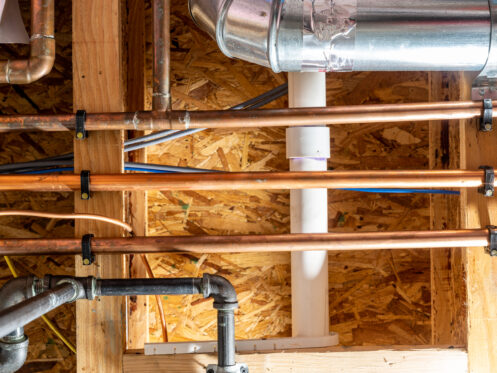A slow drip might not seem like a big deal until it quietly damages your walls, floors, or foundation. Leaks often hide where you don’t expect them, and by the time you notice, the fix can be much more complicated. That’s why ACW Service Inc in Waldorf, MD, helps homeowners catch these problems before they spread.
Why Small Leaks Cause Big Problems
Ignoring a small drip under the sink or a little water spot on the ceiling is easy. It doesn’t seem like much initially, but leaks don’t stay quiet forever. That tiny drip can soak the floor, walls, or your home’s foundation. When water gets into places it shouldn’t, it wears things down.
Wood gets soft and starts to rot. Metal pipes and fasteners can rust. Drywall crumbles. Once water finds a path, it keeps going unless you stop it. And the longer it stays hidden, the more damage it causes. Mold also loves damp places. If a leak goes unnoticed, it can create the perfect space for mold to grow. You might not see immediately, but you might smell something musty. Mold doesn’t just look gross—it can also cause you to breathe harder, especially if you have allergies or asthma.
Leaks dripping behind walls or under floors can even mess with your home’s structure. That’s when repairs start to get expensive. You’re not just fixing a pipe anymore. You might be tearing out floors or replacing a whole section of drywall. What started as a simple fix now takes more time, money, and mess.
How to Spot a Leak Before It Gets Worse
Sometimes, leaks hide in places you don’t look every day, and you won’t always hear them. That’s why it helps to check a few key spots now and then. Look under your kitchen and bathroom sinks. Run your fingers along the pipes and see if they feel damp or cold. Shine a flashlight under there and check for any signs of water drops or dark spots.
Look at the toilet’s base and along the edges of the tub or shower in the bathroom. Soft spots on the floor or stains near the ceiling below can be early warning signs. You might even notice a warped cabinet or peeling paint—those could mean water’s been getting in for a while.
Take a walk outside of your home, too. If you have an outdoor faucet, turn it on and look for dripping around the connection. You might also see wet patches near the foundation or grass that seems greener in just one area—that can point to an underground leak.
Listen to your home. If you hear water running when no one’s using it, you might have a hidden problem. Some people also notice their water bill rising even when their habits haven’t changed, which is another reason to check.
Prevent Leaks at Home
You can’t always stop a leak from starting, but you can lower the chances with a few smart habits. Start by checking the places you use most. Make sure your sink pipes are snug and dry. If you have a garbage disposal, check that the seals around it haven’t loosened.
Don’t over-tighten your faucets. That wears them out faster. Turn them off just until the water stops. If you have a washer or dishwasher, pull them out occasionally and check the hoses. Plastic hoses wear out faster than metal braided ones; you’ll have water everywhere if they pop.
When to Call a Pro
Some leaks hide behind walls, under floors, or inside ceilings. You might see a water spot or feel a soft patch on the wall but not know where the water’s coming from. In those cases, it’s better to get help. Trying to open up walls on your own can make things worse if you’re not sure what you’re doing.
A professional has tools that find leaks without tearing everything apart. They might use thermal cameras or moisture meters to find the problem. That helps them get right to the source and fix it fast.
If you have a pipe that bursts or a major leak, immediately shut off your main water valve and call for help. You can clean up the water, but don’t try to fix a broken pipe unless you know how. Some materials, like copper or PEX, require special tools or skills to repair.
If the leak has already caused mold or damage to your walls or floors, you might also need someone to help with cleanup. Mold removal has to be done carefully so it doesn’t spread. It’s not something to ignore, especially if you have kids or older people living in your house.
Catch Your Leaks Today
Small leaks don’t always stay small. Catching them early can help avoid major repairs, mold issues, or skyrocketing water bills. We help homeowners with Halo water systems, water heaters, drain cleaning, sewer camera inspection, and other plumbing services. If you’re ready to track down leaks before they get worse, call ACW Service Inc today.



